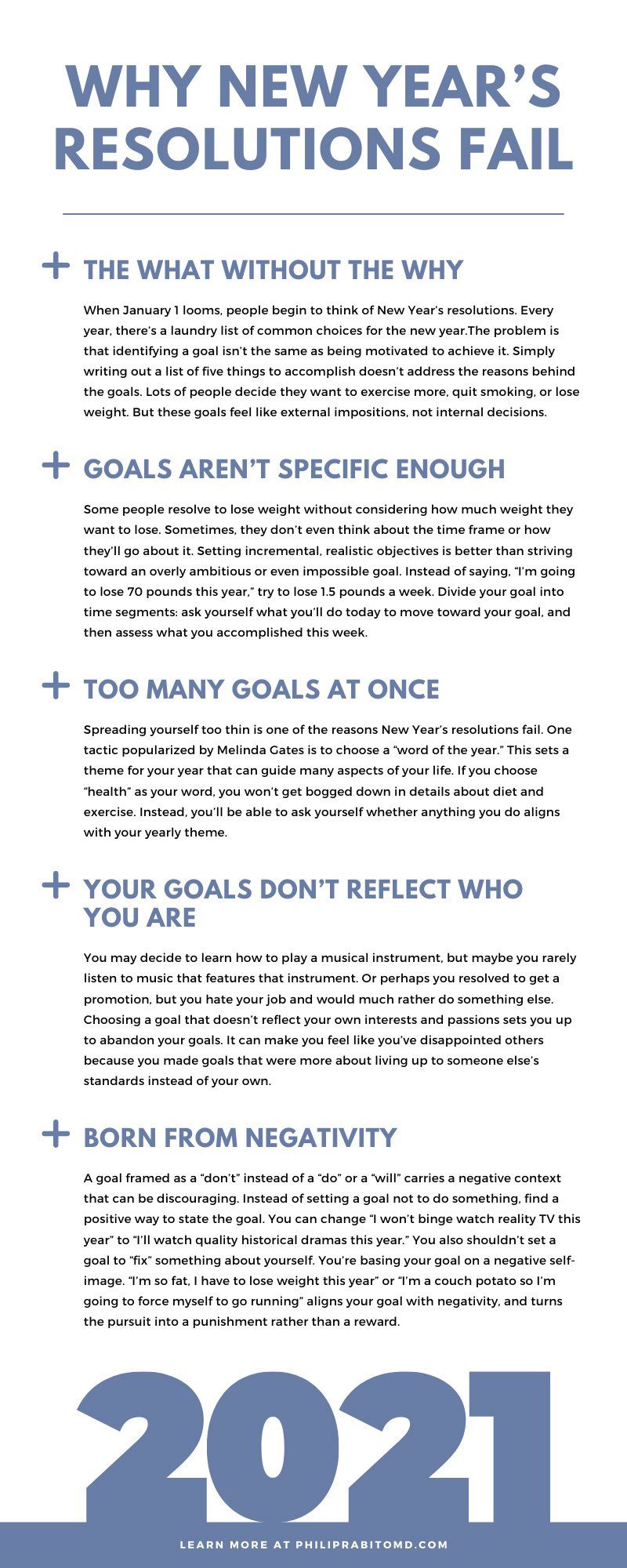After 2020, many will make ambitious resolutions for 2021. Learn why New Year’s Resolutions fail, so you can achieve, not abandon, your goals.

It’s natural to use New Year’s Day as the anchor for goal setting. But in an average year, most resolutions collapse before mid-February. Learn why New Year’s resolutions fail. If you know what to look out for, you can work on achieving your goals and avoid abandoning them.
The What Without the Why
When January 1 looms, people begin to think of New Year’s resolutions. Every year, there’s a laundry list of common choices for the new year.
The problem is that identifying a goal isn’t the same as being motivated to achieve it. Simply writing out a list of five things to accomplish doesn’t address the reasons behind the goals. Lots of people decide they want to exercise more, quit smoking, or lose weight. But these goals feel like external impositions, not internal decisions.
Whatever is on your list of potential resolutions, ask yourself, “Why do I want to do this?” or “Do I even want to do this?” Instead of adopting goals that address the expectations of others, take the time to think about what you really want for yourself. If you want to lose weight, link that to something that motivates you and keeps you emotionally involved.
You’re more likely to stick to a resolution if your motivation is to have more energy to play with your children, spend more time with your spouse, or extend your lifespan so you can meet your grandchildren one day. These emotional attachments will be more important to you than trying to meet an external standard that doesn’t have anything to do with you as a person.
Goals Aren’t Specific Enough
Some people resolve to lose weight without considering how much weight they want to lose. Sometimes, they don’t even think about the time frame or how they’ll go about it. Setting incremental, realistic objectives is better than striving toward an overly ambitious or even impossible goal.
Instead of saying, “I’m going to lose 70 pounds this year,” try to lose 1.5 pounds a week. Divide your goal into time segments: ask yourself what you’ll do today to move toward your goal, and then assess what you accomplished this week.
Too Many Goals at Once
Spreading yourself too thin is one of the reasons New Year’s resolutions fail. One tactic popularized by Melinda Gates is to choose a “word of the year.” This sets a theme for your year that can guide many aspects of your life.
If you choose “health” as your word, you won’t get bogged down in details about diet and exercise. Instead, you’ll be able to ask yourself whether anything you do aligns with your yearly theme.
Other words you could consider are “gratitude,” “calm,” or “creativity.” Choose a word you find inspiring. This will help you move through your days with a positive attitude.
Your Goals Don’t Reflect Who You Are
You may decide to learn how to play a musical instrument, but maybe you rarely listen to music that features that instrument. Or perhaps you resolved to get a promotion, but you hate your job and would much rather do something else.
Choosing a goal that doesn’t reflect your own interests and passions sets you up to abandon your goals. It can make you feel like you’ve disappointed others because you made goals that were more about living up to someone else’s standards instead of your own.
These failures come most often in the areas of diet and exercise, but they can relate to anything. Maybe you decided you’d read ten classic novels, but you enjoy contemporary stories much more.
When you set goals, make sure they center around things you want to accomplish for yourself. Don’t think of it as being selfish: when you achieve a goal you chose, you’re happier and less stressed. Your friends and family will notice your good mood.
Born From Negativity
A goal framed as a “don’t” instead of a “do” or a “will” carries a negative context that can be discouraging. Instead of setting a goal not to do something, find a positive way to state the goal. You can change “I won’t binge watch reality TV this year” to “I’ll watch quality historical dramas this year.”
You also shouldn’t set a goal to “fix” something about yourself. You’re basing your goal on a negative self-image. “I’m so fat, I have to lose weight this year” or “I’m a couch potato so I’m going to force myself to go running” aligns your goal with negativity, and turns the pursuit into a punishment rather than a reward.
“I’m going to treat myself well this year by eating healthy foods” or “I love to ride my bike through the park” are much more inspiring than “I have to go running even though it bores me to tears.”
You’re Not Ready
There’s nothing magical about January 1. People tend to push themselves into coming up with something to set as a goal when they haven’t spent enough time considering it. Think about whether you are ready to make changes to your habits and lifestyle. You’ll have a better chance of success if you work on your mindset first.
The turn of the year puts pressure on us to think of something we want to change. But picking something for no reason means your resolutions are doomed to fail. Let go of the pressure to instantly change your life in the new year. Setting and accomplishing goals is a process that doesn’t happen overnight.
Fear of Failure
Sometimes, New Year’s resolutions fail because we’re afraid of what would happen if we succeed. What happens if you do transform into a leaner, healthier you? Will your spouse resent you? If you accomplish learning a new language, will you have the guts to talk with a native speaker?
Fear causes procrastination, and procrastination is discouraging. Instead of anticipating the end result, congratulate yourself on accomplishing each step along the way. Reward yourself for making progress toward a goal, rather than beating yourself up for not achieving the goal quickly enough.
Lack of Accountability
Identifying a trusted friend or family member who can keep you accountable will help you stick to your resolutions. Your “accountability partner” can give you an objective view of your progress, cheer you on, and gently point out when you’re taking shortcuts that don’t help you toward your goal.
Pursue health and fitness goals with the guidance of your physician. When you make positive changes but don’t see positive results, something may be going on in your body that’s holding you back. Hormonal imbalances impact almost every aspect of body function. Dr. Philip Rabito is an endocrinologist in Manhattan , New York, who specializes in helping patients with weight loss and disease conditions related to hormonal issues.


